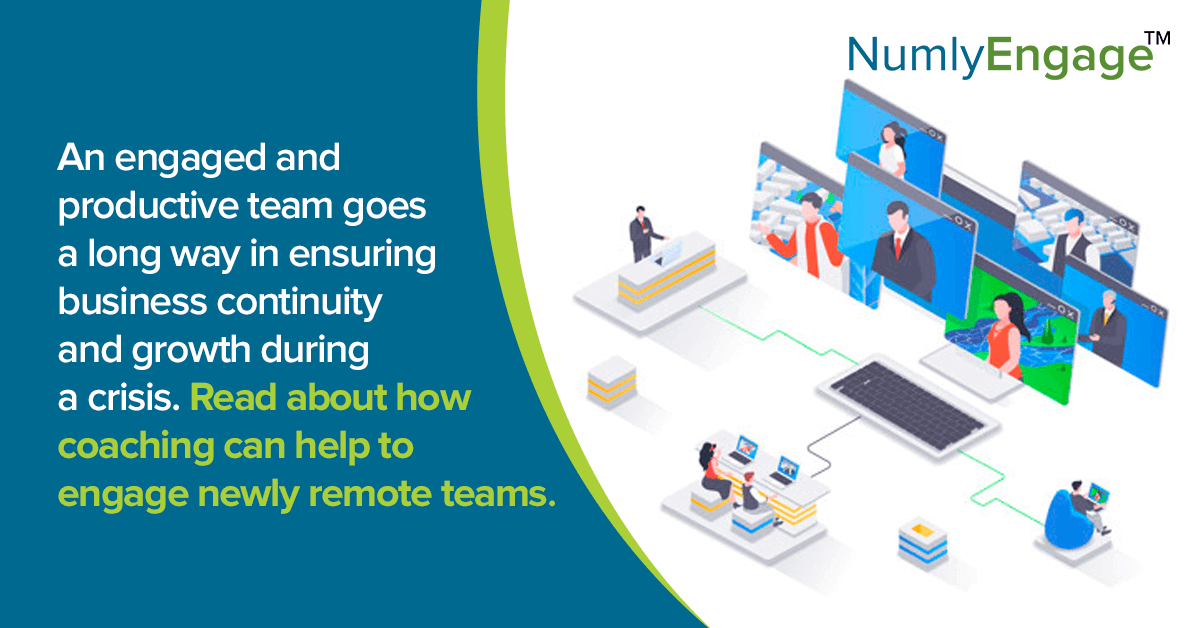Remote working is no longer the ‘new’ normal. It is just normal now.
Hallway conversations, informal lunches, and break sessions, pop-in status reports are on hold for an indefinite time. COVID-19 has ushered us firmly into the age of remote working, where even the most traditional organizations had to adopt this trend.
With the rules of engagement witnessing an overhaul, HR teams, and organization leaders are grappling with the challenge of keeping these newly remote teams engaged– especially since the individuals making up these teams have their own culture and personality.
There has been a dramatic shift in the manner in which organizations are operating today, making engagement a difficult game to win. While these unprecedented times continue to impact the workplace and the workforce, organizations have to think of creative ways to make this distanced working environment more engaging so that productivity and employee happiness are not at opposing ends.
Coaching can become a venerable tool in the HR and leadership arsenal to keep employees engaged. Here is a look at why this is so.
Maximize talent despite the distance
Remote working is different and demands a different way of leading. Organizations thus have to look at how to help their employees navigate this new normal by guiding them on maintaining a work-life balance while delivering maximum productivity.
Coaching them to adopt a flexible schedule, develop a flexible mindset, and maintain self-discipline in the absence of constant monitoring are important to drive productivity. Helping them become more goal-oriented, detail-driven with elevated accountability and ownership levels also drive productivity and engagement. By coaching effective prioritization skills and helping employees develop a ‘can-do’ attitude, organizations can keep employees effectively engaged while maximizing the talent despite the distance.
Guide for growth
Since millennials are the primary demographic in most organizations, it is imperative to remember that growth is a key engagement driver for these employees. In this remote working environment, it is natural for employees to be concerned about their growth within the organization.
Apart from identifying and providing coaching to meet the employees’ technical skill requirements, organizations also have to identify the power skills gaps by using data from assessments such as 16 Personality factor Tests and Behavioral Skills assessments. Coaching employees on these skills will tangibly impact their professional career and help them become high-potential employees. It helps in driving employee engagement by demonstrating investment and interest in employee growth.
Drive leadership development
Remote working or not, organizations have to work continuously to drive leadership development in the workplace to keep employees engaged. Whether it is to identify next-generation leaders or identify high-potential employees, a focus on leadership development also helps in keeping employees engaged, especially in the world of remote work.
Coaching can play a significant role as an enabler of engagement by helping remote employees understand how to navigate complex relationships, establish greater credibility, cultivate strategic thinking, and develop the capacity to exert influence on decision-making.
In the absence of physical interactions, leadership development coaching guides employees on building and leveraging strategic networks and drive authentic engagement needed to proceed in their careers.
Read: Critical Leadership Skills that High-Potential Women Leaders Should Be Groomed On
Bridge the skills gap
Despite the world of work going remote, organizations cannot put a pause on their upskilling and reskilling initiatives. However, while technical training programs help in closing the skills gaps, organizations also have to focus on bridging the power skills gap. Skills like communication, collaboration and influence, problem-solving, innovation and execution, strategic thinking, and the like are essential to driving productivity and engagement.
Developing a growth mindset is also a prized skill that organizations are looking for to increase the employees’ mental tenacity, especially as the world of work becomes increasingly complex and competitive.
Read: What Can Organizations Do to Develop an Entrepreneurial Growth Mindset Amongst Employees?
Coaching plays a big role in navigating the hard skills and power skills conundrum. Owing to its continuous nature, coaching outcomes drive behavioral change, which helps employees understand the organization’s investment in their growth story. This then becomes a powerful driver of engagement since enablement here drives engagement.
Empower managers to drive successful teams
The time to walk the ‘lead by example’ talk is now. In this new world of remote working, the eyes of the employees are fixed on managers and leaders. Managers need to be coached on how to identify the individual talents of individual team members. They also have to discover how to interact with and guide less-experienced employees best through challenging work situations and help them progress along their career paths. Many managers are also leading remote teams for the first time and need coaching on how to best guide their teams for success.
The absence of physical interactions also means that managers and leaders now have to become clearer in their communication skills and build skills to recognize effort, anticipate team reactions, assess team confidence, appreciate employees, and provide effective feedback. Along with this, managers also have to coach their teams for success and learn how to develop their emotional intelligence to keep team motivation and engagement high.
Read: How Has the Role of Leadership Changed with COVID-19?
Managers can rely on effective coaching to help them navigate the new challenges and implement the behavioral changes to drive highly successful teams.
The role of coaching is becoming increasingly important to keep employees happy, engaged, and productive in these challenging times.
Running and working in remote teams requires specific skillsets and new attitudes so that productivity and engagement levels remain consistently high. It is perhaps time to look towards AI-powered technology and rich analytics to drive highly relevant and contextual coaching programs and help employees deliver their best performance and remain engaged. Consistently.
Try our new 60-day pilot to drive more engagement in this challenging time.

